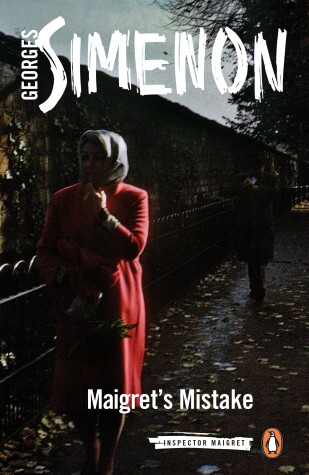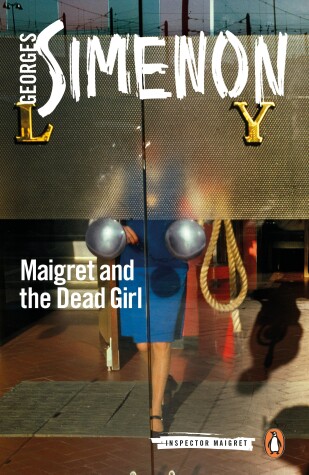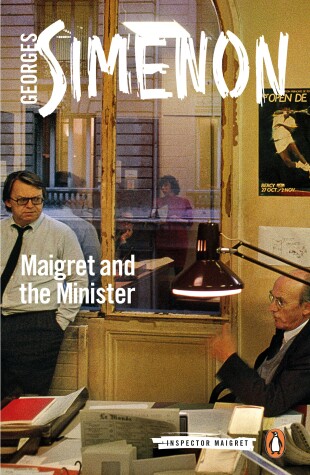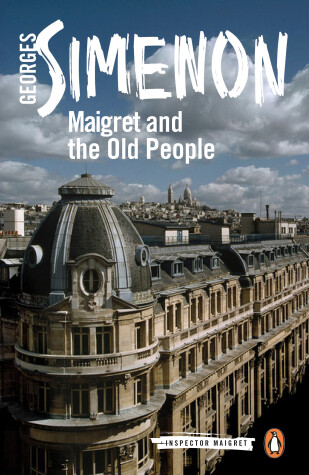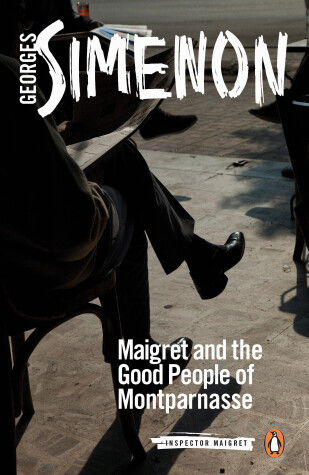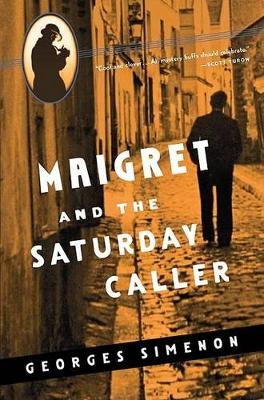Inspector Maigret
93 primary works • 95 total works
Book 43
'Irresistible . . . so tightly wound that there's no natural place to put it down' Independent
'Maigret had questioned thousands, tens of thousands of people in the course of his career, some occupying important positions, others who were more famous for their wealth, and others still who were considered the most intelligent of international criminals.
Yet he attached an importance to this interrogation he had attached to no previous interrogation, and it wasn't Gouin's social position that overawed him, or his worldwide fame.'
'One of the greatest writers of the twentieth century . . . Simenon was unequalled at making us look inside, though the ability was masked by his brilliance at absorbing us obsessively in his stories' Guardian
Book 44
Inspector Maigret becomes entangled in the dramas of a small town on his quest to solve the murder of their former postmistress
Maigret is called from his usual duties in Paris to investigate a murder in a small village located close to La Rochelle. A local postmistress has been killed and suspicion has fallen on the local schoolmaster. When Maigret gets there, he discovers a very inward-looking community of people who hated the victim because she knew all their secrets. Maigret must determine if one of those secrets was enough to make someone into a killer.
Book 45
'His artistry is supreme' John Banville
Maigret wouldn't have admitted that what intrigued him most was the victim's face. All he had seen of it so far was one profile. Was it the bruises that gave her that sullen air? She looked like a bad-tempered little girl. Her combed-back brown hair was very smooth but naturally wavy. The rain had diluted her make-up a little and, instead of making her older or uglier, it made her younger and more appealing.
Maigret and his fellow inspector Lognon find themselves trying to out-manoeuver each other when they investigate the case of a mysterious young woman whose new life in Paris is tragically cut short.
'One of the greatest writers of the twentieth century . . . Simenon was unequalled at making us look inside, though the ability was masked by his brilliance at absorbing us obsessively in his stories' Guardian
Book 46
'His artistry is supreme' John Banville
'Once alone in his office, he went over and opened the window as if being in charge of this case made him gasp for a breath of fresh air... It made him feel almost fond of the petty thieves, maniacs, swindlers and offenders of all kinds that he usually had to deal with.'
Maigret has no taste for politics, or politicians, but when he is summoned to a clandestine meeting by a desperate government minister one evening, he finds himself drawn into an unsavoury world of corruption, scandal and cover ups.
'One of the greatest writers of the twentieth century . . . Simenon was unequalled at making us look inside, though the ability was masked by his brilliance at absorbing us obsessively in his stories' Guardian
'A supreme writer . . . unforgettable vividness' Independent
Book 47
'His artistry is supreme' John Banville
'There was no lack of picturesque individuals in a neighbourhood like Quai de Valmy. But he had seldom encountered the kind of inertia he had seen in that woman. It was hard to explain. When most people look at you, there is some sort of exchange, however small. A contact is established, even if that contact is a kind of defiance.
With her, on the contrary, there was nothing.'
The discovery of a dismembered body in the Canal Saint Martin leads Maigret into a tangled, baffling case involving a taciturn bistro-owner and a mysterious inheritance.
'One of the greatest writers of the twentieth century . . . Simenon was unequalled at making us look inside, though the ability was masked by his brilliance at absorbing us obsessively in his stories' Guardian'
Book 48
Book 49
'His artistry is supreme' John Banville
Conflict rather than harmony probably reigned in eight out of ten of the still magnificent houses that surrounded the park. But he had rarely had the opportunity to breath such a strained atmosphere as the one between these walls. Everything seemed fake, grating, starting with the lodge of the concierge-cum-manservant, who was neither a concierge nor a manservant, despite his striped waistcoat, but a former poacher, a murderer turned guard dog.
When a self-made man appeals to Maigret for protection at his lavish home, a years-old grudge from the past resurfaces and the inspector finds himself questioning his own motives.
'One of the greatest writers of the twentieth century . . . Simenon was unequalled at making us look inside, though the ability was masked by his brilliance at absorbing us obsessively in his stories' Guardian
Book 50
'His artistry is supreme' John Banville
Standing here at the window in the middle of the morning, vaguely observing the comings and goings in the street, he had a feeling that reminded of certain days in his childhood, when his mother was still alive and he was off school because he had the 'flu or it was the end of term. It was the feeling of finding out 'what went on when he wasn't there'.
Inspector Maigret is meant to be taking a holiday, but he can't resist following the development of his colleague Janvier's case in the papers - and playing a few tricks on the way.
This novel has been published in a previous translation as Maigret's Little Joke.
'One of the greatest writers of the twentieth century . . . Simenon was unequalled at making us look inside, though the ability was masked by his brilliance at absorbing us obsessively in his stories' Guardian'
Book 51
'His artistry is supreme' John Banville
Eyes half-closed, head tilted against the back of his seat, he seemed not to be thinking, as the plane flew over a thick carpet of bright clouds. In reality, he was making an effort to bring names and shadowy figures to life, names and figures that even this morning had been as unknown to him as the inhabitants of another planet.
The attempted suicide of a countess and the death of a billionaire in the same luxury Paris hotel send Maigret to the Riviera and then to Switzerland, as he searches for the truth amid the glittering world of the super-rich.
This novel has been published in a previous translation as Maigret and the Millionaires.
'One of the greatest writers of the twentieth century . . . Simenon was unequalled at making us look inside, though the ability was masked by his brilliance at absorbing us obsessively in his stories' Guardian
Book 52
Inspector Maigret finds himself caught in the middle of a husband and wife duo’s case of “he said/she said”—with murderous consequences
An unusually quiet day for Inspector Maigret at the Quai des Orfèvres is disturbed by a visit from mild-mannered toy salesman Xavier Manton. Maigret is taken aback by Manton’s revelation that he suspects his wife of plotting to poison him. And when he receives a visit from Madame Manton expressing her own grave concerns later that day, he finds himself deeply conflicted, unsure of whom to trust. Maigret heeds the advice of his seniors and begins investigating the couple—and with every turn, new complications arise. When the case comes to a boil and a body is discovered, everyone, including Maigret, is shocked.
Maigret’s Doubts is an engrossing mystery of marriage and deceit that forces the reader to question whether our brilliant inspector may be fallible after all.
Book 53
'His artistry is supreme' John Banville
It was as if suddenly, long ago, life had stopped here, not the life of the man lying on the bed but the life of the house, the life of its world, and even the factory chimney that could be seen through the curtains looked obsolete and absurd.
A once-wealthy family closes ranks when one of their own is shot, leaving Maigret - along with a troublesome new magistrate - to pick his way through their secrets.
'One of the greatest writers of our time' Sunday Times
Book 54
'His artistry is supreme' John Banville
Certain details of the case were etched more sharply than others in Maigret's memory. Even years later he could recall the particular taste and smell of the rain shower in Rue Caulaincourt as keenly as a childhood memory.
At a dinner party, Maigret recounts an old case in which Adrien Josset is found guilty and executed for the murder of his wife, Christine. As the case develops under the controlling hand of the magistrate, all clues point to Josset's guilt yet Maigret is left unconvinced following his one interview with him. Years after the case, Maigret still doubts the true identity of the murderer.
This novel has been published in a previous translation as Maigret Has Doubts.
'One of the greatest writers of the twentieth century . . . Simenon was unequalled at making us look inside, though the ability was masked by his brilliance at absorbing us obsessively in his stories' Guardian
Book 55
In a great courtroom drama, Maigret has to explain why he does not belive that Gaston Meurant was capable of slitting his aunt's throat for money and smothering a small child. But in saving him from the gallows, Maigret must expose some dark secretsabout Meurant's life. A painful story of an oppressive domestic tragedy and the compassionate insight of a remarkable detective.
'A truly wonderful writer ... marvellously readable - lucid, simple, absolutely in tune with that world he creates ofrun-down hotels, cold, dark barges, quayside canal-taverns, lurking prostitutes, pot-bellied burghers, taciturn youths, slippery barmen' - Muriel Spark, Sunday Times
Book 56
'His artistry is supreme' John Banville
'He had seldom been so perplexed by human beings. Would a psychiatrist, a teacher or a novelist...have been better placed to understand characters who had suddenly materialized from another century?'
Maigret is called to the home of Armand de Saint-Hilaire, a highly respected official who has been found shot dead in his study by his housekeeper. After interviewing everyone concerned Maigret is at a loss to the identity of the perpetrator until he comes across a series of letters from the past fifty years between the victim and a recently widowed woman. As Maigret uncovers the details behind the two's relationship he gets closer to discovering the tragic truth behind the official's demise.
This novel has been published in a previous translation as Maigret in Society.
'One of the greatest writers of the twentieth century . . . Simenon was unequalled at making us look inside, though the ability was masked by his brilliance at absorbing us obsessively in his stories' Guardian
Book 57
During a high-profile hunt for the latest criminal gang to hit Paris, Maigret is determined to track down the murderer of a quiet crook whom he cannot help but respect
When the body of Honoré Cuendot, an old burglar acquaintance of Maigret’s, is found in the Bois de Boulogne with his face bashed in, Maigret is appalled that his superiors consider it a mere gangland killing. And there’s a personal element to this case as well: Maigret rather liked Cuendot. Instead of concentrating on the flashy bank robberies occupying the rest of his department, Maigret decides to inquire into Cuendot’s life—and finds himself tied up in the bank robberies, too, along the way.
A deliberate, involving murder mystery that only the likes of our trusty Inspector could solve, Maigret and the Lazy Burglar reveals that Maigret’s famous intuition is only one of his skills, and that his incredible empathy is just as important for bringing about justice.
Book 58
'His artistry is supreme' John Banville
'Why all of a sudden did this shock him? He was annoyed with himself for being shocked. He felt as if he had been sucked into the bourgeois, almost edifying, atmosphere that surrounded those epeople, 'good people' so everyone kept telling him.'
A retired manufacturer has been shot dead by his own pistol, last seen alive by his son-in-law. In this seemingly motiveless murder, Inspector Maigret must rely on his famous intuition to discover the truth.
This novel has been published in a previous translation as Maigret and the Black Sheep.
'One of the greatest writers of the twentieth century ' Guardian
Book 59
Maigret is visited by a troubled man and asks him to keep in touch, hoping to curtail his criminal impulses--but when the man disappears, Maigret must investigate a crime that may or may not have occurred
When Maigret returns home at the end of a long day, he is surprised to find a tense man named Léonard Planchon waiting on his doorstep with an unusual problem. Planchon wants to kill his wife, or perhaps his wife and her lover, who for two years have been making him sleep on a cot in the dining room. He has even worked out a plan to hide their bodies in concrete. Uneasy and hoping to stop the man before he goes too far, Maigret must investigate a murder that has not yet been committed and uncover the truth behind this peculiar ménage à trois.
A fast-paced, psychologically astute mystery, Maigret and the Saturday Caller follows the inspector through Montmartre as he patiently questions Parisian partiers, bartenders, and others as to Planchon's whereabouts, stripping away a bit more of the mystery's camouflage with each encounter until they lead him to their shocking conclusion.
Book 60
When a beggar is pulled from the River Seine, having been badly beaten, Inspector Maigret must investigate the man to uncover his attacker.
While sleeping under the Pont Marie bridge, a homeless man known as Doc is viciously beaten and thrown into the River Seine to drown. A pair of bargemen manage to rescue him, and his identification reveals he was once a doctor in Mulhouse, where, coincidentally, Inspector Maigret’s sister-in-law lives. Seizing on this connection, Maigret must delve into the man’s personal circumstances to figure out just who might have wanted him dead—and why.
A fascinating, fast-paced story about the past lives we try to leave behind, and the ways in which they return, Maigret and the Tramp is a riveting mystery from Georges Simenon.
Book 61
'Compelling, remorseless, brilliant' John Gray
During a quiet spell in June Maigret is called to investigate the disappearance of a reputable businessman. When a body is discovered near the famous Père Lachaise cemetery Maigret struggles to find any clues to the perpetrator and loses his temper when his own reputation is threatened by the case.
This novel has been published in a previous translation as Maigret Loses His Temper.
'His artistry is supreme' John Banville
'One of the greatest writers of the twentieth century . . . Simenon was unequalled at making us look inside, though the ability was masked by his brilliance at absorbing us obsessively in his stories' Guardian
Book 62
Inspector Lognon-an embittered but dedicated detective-is shot. To everyone's amazament, it emerges that Lognon had spent the last ten nights in the room of a beautiful young woman-who has disappered. In retreading Lognon's secretive last days, Maigret's investigations lead him into both the murky world of art-collecting and forgery, and the obsessive mind of a detective.
'A truly wonderful writer ... marvellously readable - lucid, simple, absolutely in tune with that world he creates of run-down hotels, cold, dark barges, quayside canal-taverns, lurking prostitutes, pot-bellied burghers, taciturn youths, slippery barmen' Muriel Spark, Sunday Times
